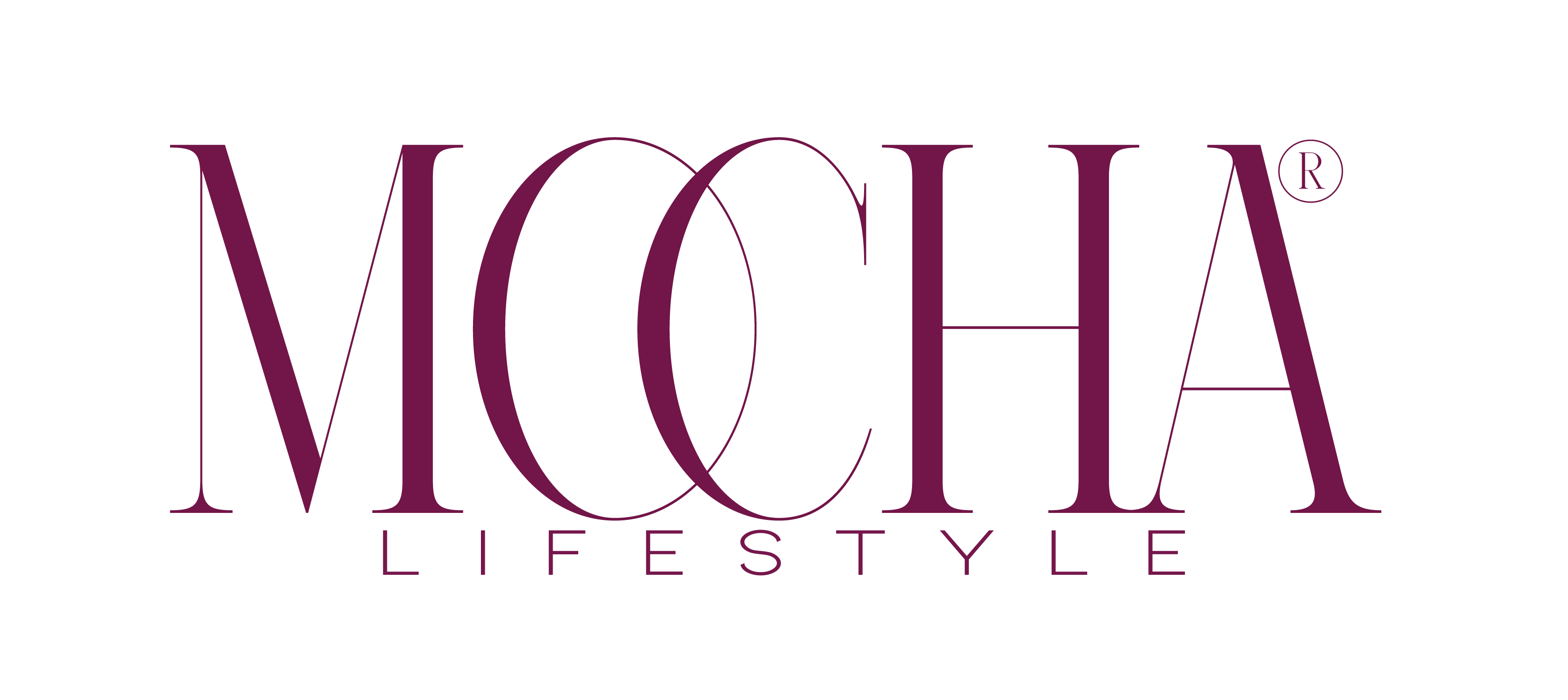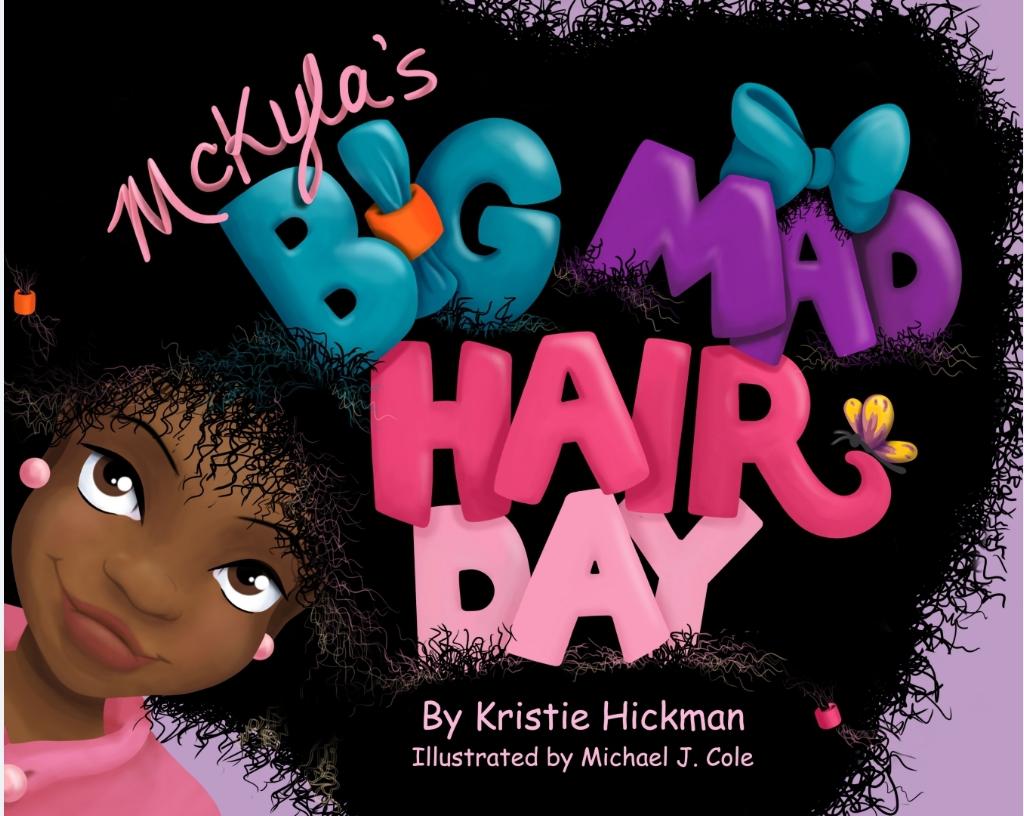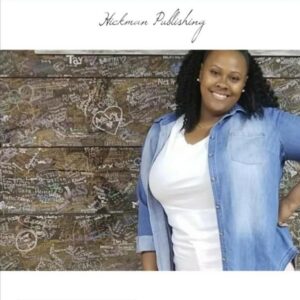It can be said that ethnic hair, although gorgeous in all of its many facets, can sometimes be challenging to maintain. However, the biggest challenge comes from confronting societal views on black hair. Let’s face it, no other race of people have been subjected to the amount of hate and criticism that black people have endured simply for their crown of hair. It is for this reason that many black parents, mothers especially, work very hard to instill self-love into their children.
No one knows this better than the author, Kristie Hickman, who confronts the struggles faced by a young girl when it comes to her curls on wash day; a day that tests the strength and sometimes even breaks down the strongest of our curly-haired little sisters.
In her latest book entitled, “McKyla´s Big Mad Hair Day,” the author navigates McKyla’s wash day routine through rhymes and vibrant illustrations, sharing a story in which many black moms and dads can relate.
Boasting a five-star rating on Amazon.com and being a favorite amongst families of color and their young daughters, this book is definitely a must-have! Eager to learn more about this special book and the author’s inspiration, we had the privilege of interviewing Kristie Hickman herself.
What were your favorite books as a child? Do they have any influence on ¨McKyla´s Big Mad Hair Day¨?
Only a few books still stick out in my mind from my childhood. “The Giving Tree” by Shel Silverstein is one that still resonates with me. The full circle effect the book presents in such a simplified, purified way was so beautiful to me as a child. The average child has no real opinion on growing old because they have no real reference point to draw from. The Giving Tree literally gave me one. It was a little sad, but sobering nonetheless.
The Giving Tree has had an impact on all of my writing. I want everything to pack a punch. I want everything to be heartfelt, truthful and elegantly pulled together.
What made you want to write?
I can’t actually pinpoint one thing in particular that made me want to write, it has always felt really good to me. I was the kid in class who was told to write one page but wrote three pages instead. Once I got into a story that I was writing it felt as if it wasn’t me writing anymore. At some point the story had to finish itself. I was just the hand that it was coming through. Poems, short stories, long stories etc., were always an artistic outlet for me.
Danielle Steele was my mother’s favorite author. She had tons of her books. She would read them diligently for weeks at a time. The fact that a book with only pages and words could keep an adult’s attention for so long was amazing to me. That made me respect writing. Discovering Sister Souljah’s classic, “The Coldest Winter Ever” validated my point of view.
How did you find your inspiration for ¨McKyla´s Big Mad Hair Day¨?
The inspiration came directly from combing my daughter’s hair. Every single line in the book is a direct and true statement. None of it is fiction. I also received inspiration from my own experience as a child getting my hair combed and braided. It’s always been a big deal.
Can you tell me more about our protagonist? Do you relate to your protagonist?
My protagonist happens to be my daughter, so I know her quite well. She is a Cancer, sweet, intense, caring, lovable, helpful, loyal, independent and so on. I could go on forever about my little one. The phrase, “sugar and spice and everything nice” always comes to mind. I can definitely relate to her in the hair realm. Just knowing that the “wash day” is coming is something that all curly heads relate to. The after effect of feeling so cute, feeling like a new person is unmatched! I remember waiting to go to school, church, anywhere just so someone could see my hair. It’s a never fading memory. We still feel like this as adults.
Who is this book for?
“McKyla’s Big Mad Hair Day” is for any mom/daughter duo who routinely struggles with “wash day.” It’s for all the little girls who dislike sitting for more than a few minutes, but love seeing their hair once it’s done. It’s for all the children with big, beautiful, luscious hair that requires a few extra steps before crossing the finish line. It’s also for parents and children with different types of hair, not just the curly cuties. Everyone can learn from McKyla’s story. Patience, following directions and keeping a positive attitude are just a few of the gems nestled in the book’s core. Oh, and it’s for boys too! If you’re looking to help your little one build confidence and self-esteem, or to help them become more culturally aware, you have found what you are looking for.
What sort of message are you trying to convey? What message do you want your readers to understand? Why is this book so important, especially now during these times?
These are such great questions. I remember watching a Judge Milian court show when I was in my early twenties and I didn’t have any children at the time and I had never combed my hair without having a relaxer. The advice Judge Milian had given a young African-American mother regarding her daughter’s hair made me so upset. The case was about a salon visit that had gone wrong. Something happened to the little girl’s hair in the process of her receiving a relaxer.
Of course Judge Milan wasn’t well versed in the history of black people’s hair. However, she told the young lady that her daughter was too young to be receiving a treatment on her hair that would change the texture. She explained that the daughter should be allowed to work with and become familiar with her own hair texture first. Once she was older and more capable of taking care of relaxed hair, she could be given the choice to chemically change her hair.
I was boiling hot with anger. I thought “how dare you tell this woman what to do with her daughter’s hair. You don’t know how hard it is to deal with natural hair. I bet you would think differently if it were your daughter’s hair with that texture.” I was rolling my eyes and everything! Needless to say I am in total agreement with the judge today.
My Aha Moment
This story is simply a testament to my mindset at the time, my thought process before letting go of relaxers. There I was a 20-year-old woman who had never learned how to comb and care for her natural hair. I literally had only memories of getting my hair washed and looking in the mirror at bouncy black coily curls. My first perm was probably at around age 6, well before I was responsible for my own hair. So I essentially learned how to comb permed hair. Any hint of new growth was frowned upon, especially as a teenager.
I went natural a few years before having my daughter. It was a struggle. I had to play catch up. That is an experience I did not want for my own child. I never imagined raising a daughter without her having a relaxer at some point during her childhood. It was almost a rite of passage during the 90s. But here I am.
We have to change the narrative regarding black hair. I want my daughter to feel comfortable at a job interview with her naturally textured hair. More importantly, I want the person interviewing her to not see her hair as a deciding factor at all. This only happens when we do the work. McKyla has to see other black women loving their hair so that she deems it normal just as I deemed relaxers normal as a child.
Were you worried about putting your voice out to the world?
I wasn’t really worried about putting my voice out to the world only because I had accepted the fact that you can’t please everyone. If someone is looking for a critique they will be sure to find one. Furthermore, your style and aesthetic won’t work for everyone. No, they aren’t all haters, some have excellent feedback and valid concerns.
Having said all that, I was very worried about specific words when I wrote the last few pages of the book. When writing about ethnic hair, words like “tamed” and “wild” have to be used with care. The words fit the rhyme pattern and meant exactly what I needed them to. So I decided to keep them. I thought to myself “If things are going to change, it has to start with me.” I have to write from a place of authenticity, which is exactly what I did.
How do you want your book to be received?
I would love for the book to become a classic. Something special for a child to remember into adulthood. It’s fun and truthful. And it captures the sass that comes along with being a child in the 2020’s.
What pushed you to publish?
Growing up I remember seeing my mother, as well as other women in my family, doing things and thinking, “When I get grown, I’m going to do that too.” This applied to both good and bad things. I never saw one of those women publish a book. So I just assumed that women like “us” didn’t publish books. We worked downtown in huge buildings, we cooked and cleaned for our families, and did whatever else I deemed to be “regular stuff” at that time. After entering into adulthood and finding my own interest, publishing was at best on my radar. It wasn’t until my daughter was born that it became a push to publish. I had written tons of material but publishing something special for her became a priority. If publishing a book is a seed I’m planting in her growing little brain, imagine what that might grow into.
What pushes you to succeed?
My mother has always pushed me to be successful. She managed to instill this “try hard” attitude within me that I can never shake. Even if I’m completely taxed and over it, the sense of finishing the job is always there. My children however push me to leave a legacy. I want them to have something physical to hold on to or pass down in my absence.
Are you planning on publishing more works for us to read? If so, what can we expect?
I am definitely planning to publish more. “Nobody’s Little Girl” is an adult novel that tackles some pretty complex issues. I can’t wait to share it. It’s a conversation starter for sure. I’m also working on my son’s first children’s novel entitled, “The Haunted Homework.” He too has been bitten by the writing bug. He’s an awesome writer and speller for his age. Spelling has never been kind to me!
What advice would you give to an aspiring author seeking to write and publish their first book?
Thoroughly research everything. There is so much info readily available that it can become overwhelming. That doesn’t mean that you should stop. Your voice needs to be heard, even if there is only one person who can relate. You never know what you may have sparked within them. Your point of view is valid. Never allow anyone to tell you differently. And lastly, visit Hickmanpublishing.com. Blogs are coming soon! I promise…



